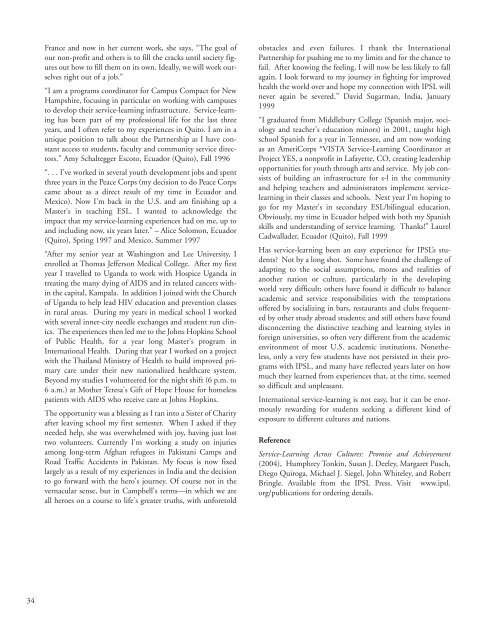Impact of Education Abroad on Career Development, Vol I - AIFS
Impact of Education Abroad on Career Development, Vol I - AIFS
Impact of Education Abroad on Career Development, Vol I - AIFS
Create successful ePaper yourself
Turn your PDF publications into a flip-book with our unique Google optimized e-Paper software.
France and now in her current work, she says, “The goal <str<strong>on</strong>g>of</str<strong>on</strong>g>our n<strong>on</strong>-pr<str<strong>on</strong>g>of</str<strong>on</strong>g>it and others is to fill the cracks until society figuresout how to fill them <strong>on</strong> its own. Ideally, we will work ourselvesright out <str<strong>on</strong>g>of</str<strong>on</strong>g> a job.”“I am a programs coordinator for Campus Compact for NewHampshire, focusing in particular <strong>on</strong> working with campusesto develop their service-learning infrastructure. Service-learninghas been part <str<strong>on</strong>g>of</str<strong>on</strong>g> my pr<str<strong>on</strong>g>of</str<strong>on</strong>g>essi<strong>on</strong>al life for the last threeyears, and I <str<strong>on</strong>g>of</str<strong>on</strong>g>ten refer to my experiences in Quito. I am in aunique positi<strong>on</strong> to talk about the Partnership as I have c<strong>on</strong>stantaccess to students, faculty and community service directors.”Amy Schaltegger Escoto, Ecuador (Quito), Fall 1996“. . . I've worked in several youth development jobs and spentthree years in the Peace Corps (my decisi<strong>on</strong> to do Peace Corpscame about as a direct result <str<strong>on</strong>g>of</str<strong>on</strong>g> my time in Ecuador andMexico). Now I'm back in the U.S. and am finishing up aMaster's in teaching ESL. I wanted to acknowledge theimpact that my service-learning experiences had <strong>on</strong> me, up toand including now, six years later.” – Alice Solom<strong>on</strong>, Ecuador(Quito), Spring 1997 and Mexico, Summer 1997“After my senior year at Washingt<strong>on</strong> and Lee University, Ienrolled at Thomas Jeffers<strong>on</strong> Medical College. After my firstyear I travelled to Uganda to work with Hospice Uganda intreating the many dying <str<strong>on</strong>g>of</str<strong>on</strong>g> AIDS and its related cancers withinthe capital, Kampala. In additi<strong>on</strong> I joined with the Church<str<strong>on</strong>g>of</str<strong>on</strong>g> Uganda to help lead HIV educati<strong>on</strong> and preventi<strong>on</strong> classesin rural areas. During my years in medical school I workedwith several inner-city needle exchanges and student run clinics.The experiences then led me to the Johns Hopkins School<str<strong>on</strong>g>of</str<strong>on</strong>g> Public Health, for a year l<strong>on</strong>g Master's program inInternati<strong>on</strong>al Health. During that year I worked <strong>on</strong> a projectwith the Thailand Ministry <str<strong>on</strong>g>of</str<strong>on</strong>g> Health to build improved primarycare under their new nati<strong>on</strong>alized healthcare system.Bey<strong>on</strong>d my studies I volunteered for the night shift (6 p.m. to6 a.m.) at Mother Teresa's Gift <str<strong>on</strong>g>of</str<strong>on</strong>g> Hope House for homelesspatients with AIDS who receive care at Johns Hopkins.The opportunity was a blessing as I ran into a Sister <str<strong>on</strong>g>of</str<strong>on</strong>g> Charityafter leaving school my first semester. When I asked if theyneeded help, she was overwhelmed with joy, having just losttwo volunteers. Currently I'm working a study <strong>on</strong> injuriesam<strong>on</strong>g l<strong>on</strong>g-term Afghan refugees in Pakistani Camps andRoad Traffic Accidents in Pakistan. My focus is now fixedlargely as a result <str<strong>on</strong>g>of</str<strong>on</strong>g> my experiences in India and the decisi<strong>on</strong>to go forward with the hero's journey. Of course not in thevernacular sense, but in Campbell's terms—in which we areall heroes <strong>on</strong> a course to life's greater truths, with unforetoldobstacles and even failures. I thank the Internati<strong>on</strong>alPartnership for pushing me to my limits and for the chance t<str<strong>on</strong>g>of</str<strong>on</strong>g>ail. After knowing the feeling, I will now be less likely to fallagain. I look forward to my journey in fighting for improvedhealth the world over and hope my c<strong>on</strong>necti<strong>on</strong> with IPSL willnever again be severed.” David Sugarman, India, January1999“I graduated from Middlebury College (Spanish major, sociologyand teacher's educati<strong>on</strong> minors) in 2001, taught highschool Spanish for a year in Tennessee, and am now workingas an AmeriCorps *VISTA Service-Learning Coordinator atProject YES, a n<strong>on</strong>pr<str<strong>on</strong>g>of</str<strong>on</strong>g>it in Lafayette, CO, creating leadershipopportunities for youth through arts and service. My job c<strong>on</strong>sists<str<strong>on</strong>g>of</str<strong>on</strong>g> building an infrastructure for s-l in the communityand helping teachers and administrators implement servicelearningin their classes and schools. Next year I'm hoping togo for my Master's in sec<strong>on</strong>dary ESL/bilingual educati<strong>on</strong>.Obviously, my time in Ecuador helped with both my Spanishskills and understanding <str<strong>on</strong>g>of</str<strong>on</strong>g> service learning. Thanks!” LaurelCadwallader, Ecuador (Quito), Fall 1999Has service-learning been an easy experience for IPSL’s students?Not by a l<strong>on</strong>g shot. Some have found the challenge <str<strong>on</strong>g>of</str<strong>on</strong>g>adapting to the social assumpti<strong>on</strong>s, mores and realities <str<strong>on</strong>g>of</str<strong>on</strong>g>another nati<strong>on</strong> or culture, particularly in the developingworld very difficult; others have found it difficult to balanceacademic and service resp<strong>on</strong>sibilities with the temptati<strong>on</strong>s<str<strong>on</strong>g>of</str<strong>on</strong>g>fered by socializing in bars, restaurants and clubs frequentedby other study abroad students; and still others have founddisc<strong>on</strong>certing the distinctive teaching and learning styles inforeign universities, so <str<strong>on</strong>g>of</str<strong>on</strong>g>ten very different from the academicenvir<strong>on</strong>ment <str<strong>on</strong>g>of</str<strong>on</strong>g> most U.S. academic instituti<strong>on</strong>s. N<strong>on</strong>etheless,<strong>on</strong>ly a very few students have not persisted in their programswith IPSL, and many have reflected years later <strong>on</strong> howmuch they learned from experiences that, at the time, seemedso difficult and unpleasant.Internati<strong>on</strong>al service-learning is not easy, but it can be enormouslyrewarding for students seeking a different kind <str<strong>on</strong>g>of</str<strong>on</strong>g>exposure to different cultures and nati<strong>on</strong>s.ReferenceService-Learning Across Cultures: Promise and Achievement(2004), Humphrey T<strong>on</strong>kin, Susan J. Deeley, Margaret Pusch,Diego Quiroga, Michael J. Siegel, John Whiteley, and RobertBringle. Available from the IPSL Press. Visit www.ipsl.org/publicati<strong>on</strong>s for ordering details.34


